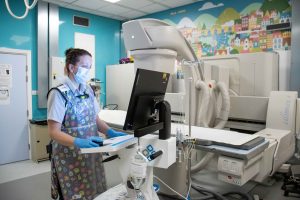Help to transform our extraordinary hospital into something even better.
- Refine search:

Urology is all about looking after problems with the kidneys, ureters, bladder and genitals. On this page you will find lots of information about our team, how we care for children and young people, and the investigations and procedures we carry out at Sheffield Children’s.
We provide specialist care for children and young people both in the hospital and at home. Our patients might come from Sheffield, the Yorkshire and Humber region or nationally.
As a team we aim to continually improve the quality of urology care in children, using international learning and studies to guide our care.
In the community we support children and young people who have to catheterise – which means using a tube to drain the bladder – to help provide a holistic service.
We also provide education and training to families and other healthcare professionals. As a team we work closely with the Continence team based at Centenary House and their products assessment service.
 Our Urology team is a mix of surgeons, doctors, nurses, support workers and administration staff. You can find out more about each of us on our team page.
Our Urology team is a mix of surgeons, doctors, nurses, support workers and administration staff. You can find out more about each of us on our team page.
The Urology team offers a range of clinics.
Our nurse clinics are particularly useful for issues of wetting, they are experts in all the tips and tricks to help stay dry. We also have a clinic where we follow children and young people who have – or might have – kidney problems with the Nephrology team. The Nephrology team look after the filtering part of the kidney, whilst we make sure the pee drains.
The Acquired Spinal Injury clinic looks after patients who have bladder problems because of an injury to the spine. We have a combined spinal clinic which looks after children who were born with spinal problems.
The team cares for patients up to the age of 16, when we help introduce you to the teams who will continue to look after young people as they get older. This means they can have confidence in the care they will continue to receive.
This means tests which will only require a day trip to hospital:
Common surgeries performed by the team include:
Doctors will now use the term DSD but you may also hear the term ‘intersex’ used by some groups instead.
Urology patient information leaflets are available in the Resource Library
You can find lots of information about different urology conditions and treatments at the Resource Library, along with a useful video below.
A story written by one of our patients, read by Jon Richardson, patron of The Children’s Hospital Charity.
By continuing to use the site, you agree to the use of cookies. more information
The cookie settings on this website are set to "allow cookies" to give you the best browsing experience possible. If you continue to use this website without changing your cookie settings or you click "Accept" below then you are consenting to this.